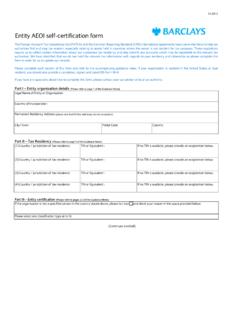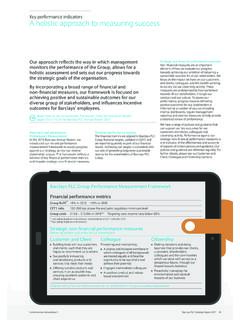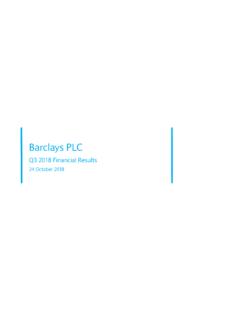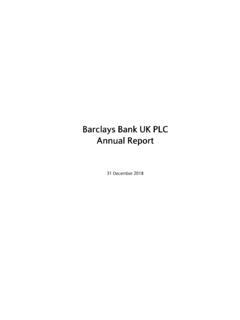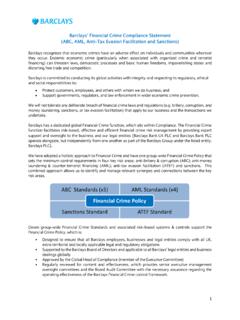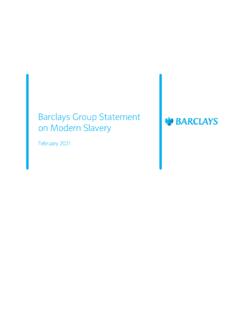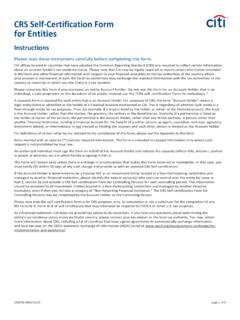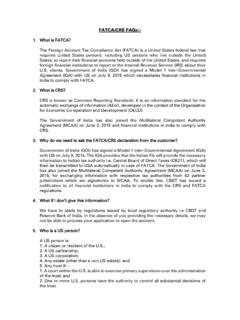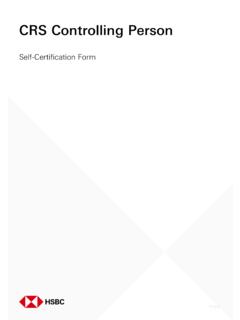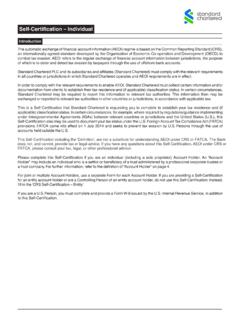Transcription of Entity AEOI self-certification guidance notes
1 Sections are mandatory. Please include Entity status Ltd or LLP. PO Box addresses are not II Tax ResidencyBeginning with the Foreign Account Tax Compliance Act ( fatca ) in 2014 and additionally the Common Reporting Standard (CRS) in 2016, new international agreements involving a large number of countries have come into force to help tax authorities find and stop tax evasion, especially relating to assets held in countries where the owner is not resident for tax of tax residencePlease provide for each of these jurisdictions a Tax Identification Number (TIN) of your Entity where applicable. InstructionsPart I Entity organisation detailsPlease complete each box and ensure you include your Entity s legal status ( Ltd, Plc, LLP).Part II Tax residencyComplete a separate row for every country that this Entity tax III Entity certificationAll entities are required to complete this IV Controlling PersonsComplete if you are 'Financial Institution that is an Investment Entity located in a non-participating jurisdiction and managed by another FI or Passive V - Declaration & Signature Complete ensuring the signature has been completed by an authorised signatory of the AEOI self -certification guidance notesThese international agreements create a legal obligation requiring all financial institutions, including Barclays, to:It is mandatory to supply a TIN or functional equivalent if the country in which you are tax resident issues such identifiers.
2 The TIN is combination of letter's and/ or numbers assigned to the Entity or organisation by its country of residence (or its tax authorities) to identify the Entity for tax purposes. An example of a TIN from a country tax resident in the UK is an Entity 's Unique Taxpayers Reference Number (xxxxx xxxxx).If unable to obtain a TIN then please provide an explanation, such as: "the company has yet to recieve its TIN from the relevant tax authority"Part I Entity /Organisation DetailsTIN or functional equivalentb) the stock of the NFE is regularly traded on an established securities market or the NFE is a Related Entity of an Entity the stock of which is regularly traded on an established securities market;c) the NFE is a Governmental Entity , an International Organisation, Central Bank or an Entity wholly owned by one or more of the foregoing.
3 D) substantially all of the activities of the NFE consist of holding (in whole or in part) the outstanding stock of, or providing financing and services to, one or more subsidiaries that engage in trades or businesses other than the business of a Financial Institution, except that an Entity does not qualify for this status if the Entity functions (or holds itself out) as an investment fund, such as a private equity fund, venture capital fund, leveraged by you to fund, or any investment vehicle whose purpose is to acquire or fund companies and then hold interests in those companies as capital assets for investment purposes; e) the NFE is not yet operating a business and has no prior operating history, (a start-up NFE ) but is investing capital into assets with the intent to operate a business other than that of a Financial Institution, provided that the NFE does not qualify for this exception after the date that is 24 months after the date of the initial organisation of the NFE; f) the NFE was not a Financial Institution in the past five years, and is in the process of liquidating its assets or is reorganising with the intent to continue or recommence operations in a business other than that of a Financial NFE primarily engages in financing and hedging transactions with, or for, continue or recommence operations in a business other than that of a Financial Institution.
4 InstructionAn NFE is an Active NFE if it meets any of the criteria listed below. In summary, those criteria refer to: Active NFEs by reason of income and assets; Publically traded NFEs; Governmental Entities, International Organisations, Central Banks, or wholly owned Entities; Holding NFEs that are members of a nonfinancial group Start-Up NFEs; NFEs that are liquidating or emerging from bankruptcy; Treasury centres that are members of a nonfinancial group; or Non-profit NFEsAn Entity will be classified as Active NFE if it meets any of the following criteria:a) less than 50% of the NFE s gross income for the preceding calendar year or other appropriate reporting period is passive income and less than 50% of the assets held by the NFE during the preceding calendar year or other appropriate reporting period are assets that produce or are held for the production of passive income.
5 Part III Entity CertificationActive Non-Financial Entity ("NFE") classificationPlease select one classification, a) to h).Specified PersonThe term Specified Person is defined by reference to local laws in the country where the Entity is established. In the UK a Specified United Kingdom Person means a person or Entity who is resident in the UK for tax purposes, other than:(i) A corporation the stock of which is regularly traded on one or more established securities markets;(ii) Any corporation that is a Related Entity of a corporation described in clause (i);(iii) A Depository Institution;(iv) A broker or dealer in securities, commodities, or derivative financial instruments (including notional principal contracts,futures, forwards, and options) that is registered as such under the laws of the United Kingdom;(v) a Government Entity .
6 (vi) An International Organisation (examples of which include The International Monetary Fund, The World Bank, TheInternational Bank for Reconstruction and Development and The European Community For a full list please see therelevant guidance under the Tax Regulations);(vii) A Central Bank; or(viii) A pension scheme or other arrangement registered with HMRC under Part 4 of the Finance Act 2004 Specified Persong) the NFE primarily engages in financing and hedging transactions with, or for, Related Entities that are not Financial Institutions, and does not provide financing or hedging services to any Entity that is not a Related Entity , provided that the group of any such Related Entities is primarily engaged in a business other than that of a Financial Institution or;h) the NFE meets all of the following requirements (a non-profit NFE ) :i) it is established and operated in its jurisdiction of residence exclusively for religious, charitable, scientific, artistic, cultural, athletic, or educational purposes; or it is established and operated in its jurisdiction of residence and it is a professional organisation, business league, chamber of commerce, labour organisation, agricultural or horticultural organisation, civic league or an organisation operated exclusively for the promotion of social welfare;ii) it is exempt from income tax in its jurisdiction of residence;iii) it has no shareholders or members who have apropriety or beneficial interest in its income or assets.
7 Iv) the applicable laws of the NFE s jurisdiction of residence or the NFE s formation documents do not permit any income or assets of the NFE to be distributed to, or applied for the benefit of, a private person or non-charitable Entity other than pursuant to the conduct of the NFE s charitable activities, or as payment of reasonable compensation for services rendered, or as payment representing the fair market value of property which the NFE has purchased; and v) the applicable laws of the NFE s jurisdiction of residence or the NFE s formation documents require that, upon the NFE s liquidation or dissolution, all of its assets be distributed to a Governmental Entity or other non-profit organisation, or escheat to the government of the NFE s jurisdiction of residence or any political NFEU nder the CRS a Passive NFE means any: (i) NFE that is not an Active NFE; and (ii) Investment Entity located in a Non-Participating Jurisdiction and managed by another Financial term Financial Institution means a Custodial Institution, a Depository Institution, an Investment Entity or a Specified Insurance Company.
8 (If applicable only Under fatca , if your organisation is a Financial Institution (FI), the assumption will be that an FI will register with the IRS and obtain a GIIN unless it is able to certify that it is exempted from the Foreign Financial Institution (FFI) category. A GIIN is the identification number used to identify the FFI for fatca registration purposes and information reporting Bank PLC is required to verify that the Entity name and the GIIN match the IRS database once it is your status requires you to have a GIIN you must provide one. Failure to provide this in a timely manner may result in you being classified as a reportable Entity and, where there is US income, in some circumstances there may be withholding applied to any payments. Investment Entity located in a Non-Participating Jurisdiction and managed by another Financial Institution This term means any Entity the gross income of which is primarily attributable to investing, reinvesting, or trading in Financial Assets if the Entity is (i) managed by a Financial Institution and (ii) not a Participating Jurisdiction Financial Institution.)
9 Investment Entity managed by another Financial Institution An Entity is managed by another Entity if the managing Entity performs, either directly or through another service provider on behalf of the managed Entity , any of the activities or operations described in clause (i) above in the definition of Investment Entity . An Entity only manages another Entity if it has discretionary authority to manage the other Entity s assets (either in whole or part). Where an Entity is managed by a mix of Financial Institutions, NFEs or individuals, the Entity is considered to be managed by another Entity that is a Depository Institution, a Custodial Institution, a Specified Insurance Company, or the first type of Investment Entity , if any of the managing Entities is such another Institution (FI)If your organisation is a FI, please completeControlling person - An Entity is controlled by the persons or entities who hold at least 10% of the voting shares in the Entity or who are known to exercise significant influence over the policy, business and strategy of the Entity .
10 (Please see below for definition of Control ) Controlling Persons are the natural person(s) who exercise control over an Entity . Where that Entity is treated as a Passive Non-Financial Entity ( Passive NFE ) then a Financial Institution is required to determine whether or not these Controlling Persons are Reportable Persons. This definition corresponds to the term beneficial owner described in Recommendation 10 and the Interpretative Note on Recommendation 10 of the Financial Action Task Force Recommendations (as adopted in February 2012).In the case of a trust, the Controlling Person(s) are the settlor(s), the trustee(s), the protector(s) (if any), the beneficiary(ies) or class(es) of beneficiaries, or any other natural person(s) exercising ultimate effective control over the trust (including through a chain of control or ownership).
